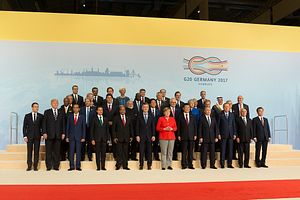As the leaders of the G-20 group of major economies gather in Buenos Aires, they do so with ten years of positive experience behind them. However, after November’s APEC meeting ended with no agreed communique for the first time in the forum’s 30-year history, it’s feared this latest G-20 event will turn out to be a somewhat ceremonial occasion. Expectations are low and hopes for a successful meeting are slim.
Over the past decade, the G20 summit has evolved from being a risk management “band-aid” solution to a medium- and long-term “Vitamin C” strategy for the world economy. However, at a time when there is supposed to be greater global economic governance, the organization seems to be on a road back to where it started, with the upcoming session’s theme billed as “Building Consensus for Fair and Sustainable Development.”
True, consensus is a rarity in today’s political landscape, at a time when economic globalization is suffering setbacks and multilateralism and free trade are coming under sustained assault. Facing such strong headwinds, maybe it’s helpful to look back through history to see what has been done in the past to lift the world economy out of the doldrums.
Openness and inclusiveness are key to the G-20 summit mechanism. In late 2008, after the financial tornado wiped out giants such as Lehman Brothers and tortured Wall Street, the world came to realize that the G-7 formula was no longer enough to solve the world’s problems, and so other major players were invited to take a seat at the table for a concerted effort. The G-20 group, consisting of Argentina, Australia, Brazil, Canada, China, France, Germany, India, Indonesia, Italy, Japan, Mexico, the Republic of Korea, Russia, Saudi Arabia, South Africa, Turkey, the United Kingdom, the United States and the European Union (EU), accounts for 85 percent of the world’s GDP and 80 percent of total trade volume, and so well fits the definition of “inclusiveness.” Its members have put forward actual plans and tools to make the world even more so.
G-20 summits in the past few years have been, on the whole, successful. Leaders demonstrated a strong political will to rescue the global economy from the worst financial crisis in 70 years. The world came to agree that finger pointing didn’t help. In finding solutions to the economic crisis, the world agreed to overhaul the financial system, with a determination to carry out a “genuine, all-encompassing reform of the international financial system,” which the media dubbed Bretton Woods II.
Swift action served to stoke the engine of the world economy to get it moving again. The United States, for example, strengthened its monetary and fiscal policies, reducing interest rates to a record low, while at the same time rolling out the largest-ever stimulus package of $700 billion. Across the Pacific, China unveiled its own stimulus package of 4 trillion yuan, about $580 billion, aimed at reviving its economy, which in turn helped stabilize the world economy. Since then, China has continued to contribute more than a third of world economic growth, according to the World Bank. A prompt injection of liquidity into the financial sector averted the trend of contraction, and kept the boat of the world economy afloat.
The maxim remains: help others to help yourself.
Cooperation was the motor to get the ship of the world economy sailing full steam ahead. The G-20 summits achieved a general consensus on how to cooperate in key areas to deal with the financial crisis, improve financial regulation over the medium term to avoid similar crises in the future, and later on, to unleash growth potential and improve the resilience of the global financial system to promote sustainable growth.
Like it or not, the world is in the same boat. Squabbles on board not only devastate the parties involved but bring suffering to innocent bystanders too. Only when everybody rows in the same direction can the boat move out of troubled waters. It has been proven that the world has the wisdom and will to right the wrongs.
Now, all eyes are on the Buenos Aires summit. The question of “Does the G-20 still matter?” is being posed more often. The answer must surely be yes, and even more so this year. With some multilateral mechanisms seemingly paralyzed, the G-20 summit, born as a response to crisis, may be better placed to play a decisive role.
Though each member has its own mandate, the G-20 Summit “is essentially about consensus-building, establishing a workable middle way that can oil the wheels of the world’s crowded and complex financial and economic systems,” as the Hangzhou summit in 2016 made clear. In the upcoming summit, China intends to reaffirm its commitment to opening-up and multilateralism and is willing to build broader international consensus on promoting mutually beneficial cooperation and common development.
History has taught us that multilateralism, as exemplified by the G20, can be a deal-maker, not a deal-breaker.
Wang Shanshan is a current affairs commentator based in Beijing, China.

































